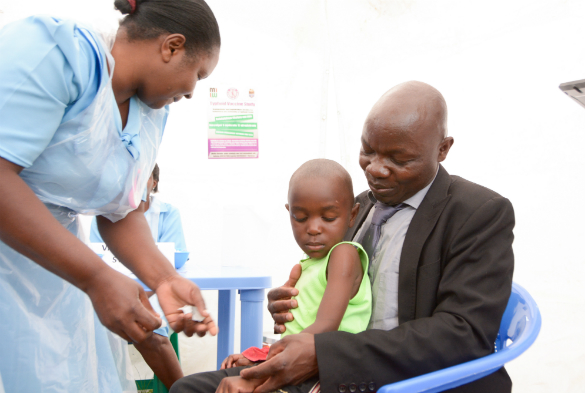
A new study, published today in the Lancet, finds that a single dose of Typhoid Conjugate Vaccine (TCV) is over 78% percent effective in protecting children in Malawi across at least 4 years.
These longer duration data come at a time of growing drug resistance and increased extreme weather events, which increase the risk of typhoid. Indeed, Malawi itself suffered serious disruption last year from cyclone Freddy. There are estimated to be more than nine million typhoid cases and more than 110,000 deaths globally.
The Malawi-Liverpool-Wellcome Trust (MLW) Programme led the study in Malawi, in partnership with the University of Liverpool, the Blantyre Malaria Project (BMP), and the University of Maryland School of Medicine’s Center for Vaccine Development and Global Health.
MLW’s Professor Melita Gordon (University of Liverpool NIHR Research Professor), said: “TCV offers an excellent option to control new and existing strains of typhoid in Malawi. It is especially important because of the problem of drug resistance that we see here. We are thrilled that the Malawi Ministry of Health has now introduced TCV nationwide through a campaign in May this year, targeting 9 million children, followed by integration into routine immunization. These efforts will make a real impact and protect millions of children who are disproportionately impacted by typhoid.”
“A single dose of TCV is a safe and cost-effective way to prevent typhoid fever and save lives in Malawi”, said Dr Queen Dube, the Chief of Health Services in Malawi. “This vaccine offers promise of protection for millions of children living in low- and middle-income countries where typhoid remains a real and present day-to-day risk.”
The phase 3 double-blinded study included over 28,000 children aged from 9 months to 12 years, who were randomized 1:1 to receive TCV or the control vaccine, a vaccine against meningitis. Children vaccinated between 21 February and 27 September 2018 were followed through to September 2022. Blood culture tests were used to confirm typhoid in children with febrile illness. Over 4 years, vaccine efficacy was estimated to fall by just 1.3% per year, suggesting that protection from the vaccine is very durable. TCV was also effective at preventing typhoid in all age groups, including the youngest, which is important when TCV is used as a routine childhood vaccine.
These are the longest-term data on Typhoid Conjugate protection yet published globally, and are part of the Typhoid Vaccine Acceleration Consortium (TyVAC), which aims to accelerate introduction of TCV as part of an integrated approach to reduce the burden of typhoid in countries eligible for support from Gavi, the Vaccine Alliance. The findings are critical as typhoid is an increasing public health threat across sub-Saharan Africa due to the emergence and spread of multi-drug resistant strains present in Malawi.
“With typhoid disproportionately impacting school-age and pre-school children, TCV has the potential to have an important public health benefit as countries introduce the vaccine into their immunization programs. Malawi is a perfect example of a country with widespread typhoid fever that made the choice to introduce this life-saving vaccine as part of an integrated campaign with measles-rubella vaccine, oral polio vaccine, and vitamin A,” says Kathleen Neuzil, MD, MPH, the Myron M. Levine, MD, DTPH, Professor in Vaccinology, and TyVAC director.
Typhoid, a bacterial infection caused by Salmonella enterica serovar Typhi, is a serious threat in many low- and middle-income countries. In 2017, the World Health Organization recommended TCV for children six months of age and older in typhoid endemic settings. Typhoid causes complicated or severe disease in up to 14% of children, but the effects can go beyond illness and death. Typhoid can impair physical and cognitive development in children, affect school attendance and performance, limit productivity, cause catastrophic economic costs to families, and reduce earning potential.
TCV is a proven safe and effective way to prevent typhoid. The TyVAC study in Malawi now provides critical longer-term data for global and country-level decision-making by governments across Africa and Asia. TCV can help combat the growing threat of antimicrobial resistance and ultimately, save lives.
TyVAC is funded by the Bill & Melinda Gates Foundation. Professor Gordon is funded as a Research Professor by the UK National Institute of Health and Care Research. Typbar TCV® is licensed by Bharat Biotech International Limited, Hyderabad, India.
Click here to read the full study.
Click here to read the associated commentary.
Photo caption: Four year old Golden Kondowe receives his typhoid vaccination in Malawi [Credit: Sabin Vaccine Institute/Thoko Chikondi]